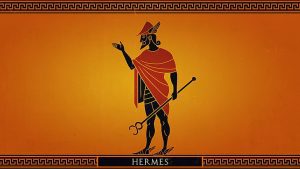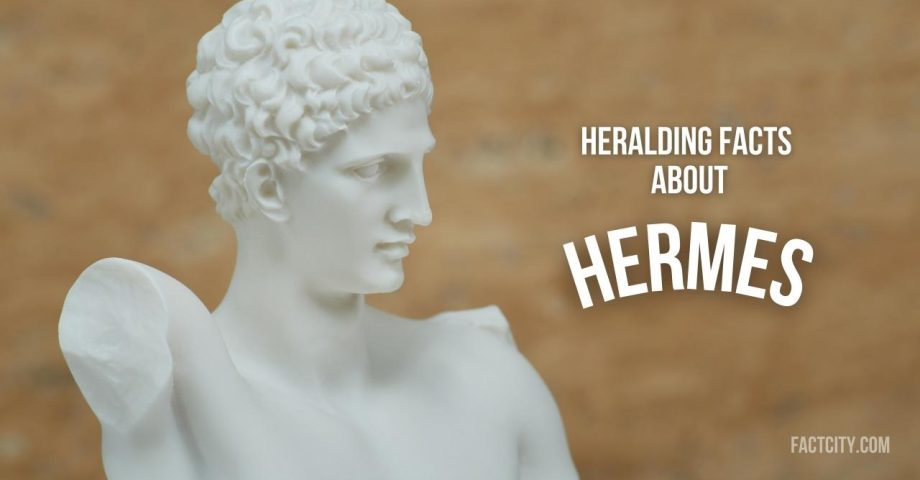10 Heralding Facts about Hermes
Although we know that Hermes famously lends his name to expensive bags these days, we’re here to talk about the messenger of the Gods himself, in all of his winged shoed glory. What is it about the Gods’ messenger that makes him so iconic? Here are some fun facts about Hermes to keep in mind for the next pub quiz.
1. Who was Hermes?
The name may not ring a bell, but the chances are that you have already seen plenty of depictions of Hermes! He was an important deity in Greek mythology and was known as the messenger of the Gods. He was the son of Zeus and the Pleiad Maia, making him one of the Olympian Gods.
2. Shoes with wings!
Hermes was often depicted as a youthful and athletic figure with winged sandals, a winged hat (petasos), and a herald’s staff (caduceus). These items symbolize his role as a messenger and traveler. Our fancy light-up and rolling shoes don’t seem nearly as cool now, do they?
3. He was more than just a messenger.
Although Hermes was primarily known as being the messenger of the Gods, Hermes was also associated with several other domains. He was also the God of commerce, trade, thieves, travelers, boundaries, and shepherds. Basically, he was a busy guy!

4. Faster than fast. Quicker than quick. He was Hermes!
Hermes was well-known for his speed and agility. He was believed to be the fastest of all the Gods. He had the ability to move swiftly between the realms of the Gods, humans, and the underworld.
5. He was a bit of a trickster!
Hermes was also known for being a clever and mischievous God. He was often portrayed as a trickster, known for his cunning and ability to deceive both Gods and mortals.
6. He was also the God of commerce.
As strange as it may seem, Hermes was also the God of commerce. This also made Hermes the patron of merchants, traders, and thieves. Many believed he watched over commercial activities and protect travelers on their journeys, which made him very important to a great many people!
7. He managed to fit in being a psychopomp, too!
Hermes also had a role as a psychopomp. It was his duty to guide the souls of the deceased to the underworld. He would escort them to the realm of Hades, ensuring a safe passage to the afterlife.
8. He helped to bring us Pan.
Hermes had many children of his own! He had many offspring, including Pan, the half-human, half-goat God of nature and shepherds.
9. Hermes was also a passionate inventor.
In some myths, Hermes received the credit of inventing the lyre, a stringed musical instrument. Many believed that he then gifted said lyre to Apollo, the God of music, in exchange for Apollo’s cattle. It’s a deal that must have made sense at the time!

10. What about the Hermaea?
Hermes had a significant presence in Ancient Greek religion and was honored with various festivals and cults throughout Greece. The Hermaea, celebrated in Athens, was a festival dedicated to Hermes, emphasizing athletics and the education of young boys.
FAQs about Hermes
Was Hermes the most powerful God?
No, Hermes was never considered to be the most powerful God. Most believed that Zeus was the most powerful among the Gods. However, Hermes was known for being very intelligent and for having a great deal of influence over a lot of things, making him indeed very powerful, too.
Was Hermes a good or bad God?
Whether or not Hermes was good or bad really depends on your own interpretations of the myths! He was definitely seen as being good by the Greeks during their war against the Trojans! However, he was also a trickster, very capable of defiance and mischief.
Who did Hermes love?
Hermes had multiple lovers, including Aphrodite, Persephone, and even certain mortals. Many believe he also had male lovers, potentially even including Perseus! He had multiple children, too.
Further reading:
https://factcity.com/tag/greek-gods/
https://www.worldhistory.org/Hermes/
https://www.greekmythology.com/Olympians/Hermes/hermes.html
Do you know any fun facts about Hermes? Share them in the comments below!
This page was last modified on August 24, 2023. Suggest an edit









